The Best Purchase Requisition Software
Purchase requisition software automates creating and approving purchase requests and purchase orders. We evaluated the best platforms for companies of all sizes, from small businesses to large enterprises.
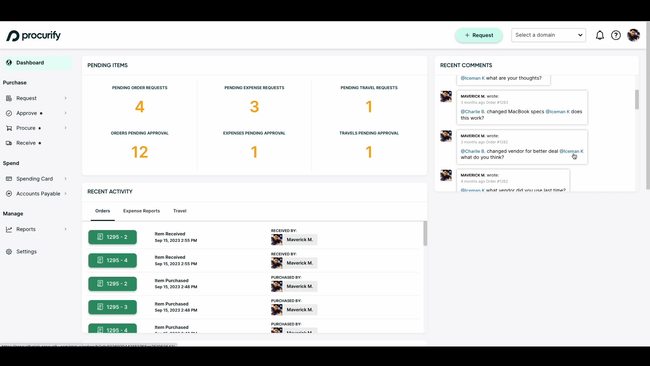
- Integrates with accounting systems
- Cloud-based platform provides remote and mobile access
- Tracks orders and automates reordering
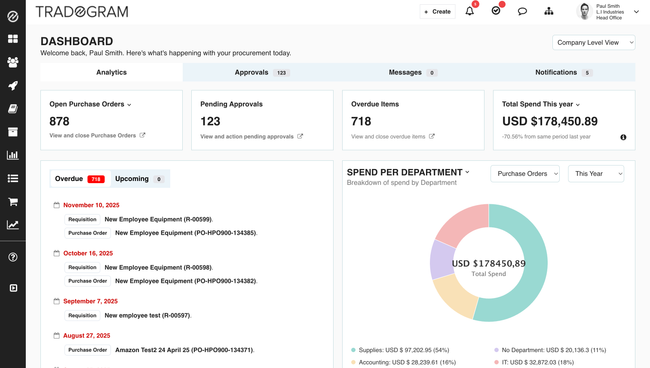
- Offers light budgeting, project, and inventory features
- Integrations for most accounting systems e.g. QuickBooks, NetSuite, Sage, Xero
- Free procurement software for 1 user
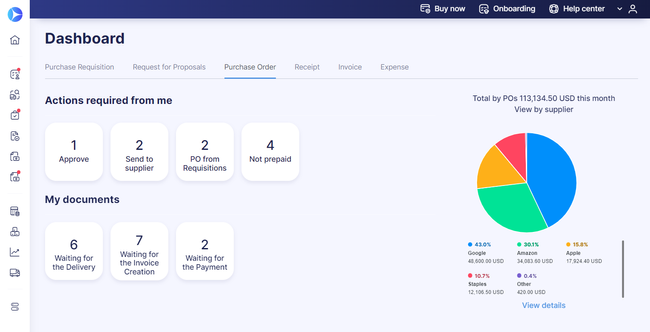
- Simple and straightforward pricing
- Both punchout and Punch-In catalogs
- Integrations for the top accounting systems e.g. QuickBooks Online, NetSuite, Xero
We assessed requisitioning software using our advanced review methodology. As a subset of procurement software, these platforms streamline purchasing and control spending.
- Procurify: Best Overall
- Tradogram: Best Integration Options
- Precoro: Best for Small Businesses
- Tipalti: Best for Large Companies
- Fraxion: Best Mobile App
- ProcureDesk: Best for Retail
- Coupa: Best for Professional Services
Procurify - Best Overall
Procurify includes budget control and approval routing tools that minimize financial risk and help you maintain control over spending. Through user-friendly dashboards, approvers can monitor expenses against organizational or project budgets directly within the platform.
The software incorporates customizable approval workflows that streamline purchase request routing to the relevant individuals or departments. You can tailor these workflows based on different organizational structures:
- Departmental needs: Routes approvals to department heads based on the specific team making the request.
- Purchasing types: Configures workflows for specific categories like office supplies, IT equipment, or raw materials.
- Project categories: Ties requests to specific projects, then routes them to project managers or financial controllers.
By enforcing this hierarchical approval process, Procurify ensures all requests pass through the right channels for review and authorization.
Procurify starts at around $1,000 per month for small businesses and $2,000 per month for mid-sized companies. Enterprise plans require a custom quote.
Read our Procurify profile for more details.
Tradogram - Best Integration Options
Tradogram is a complete spend management system that integrates with cloud-based and on-premises software. Tradogram integrates with the top ERP software like SAP, Sage 50, and Blackbaud.
In addition to the standard procurement software features, Tradogram includes support for multiple companies, expense management, and simple inventory tracking. This software is one of the more affordable options on the market. It includes a free plan for a single user and five transactions per month.
Tradogram allows users to create and send purchase requisitions with an internet connection from any device. This requisition system tracks suppliers, vendors, and purchase orders. It also generates procurement reports that aim to maintain budgets and prevent unnecessary spending.
Precoro - Best for Small Businesses
Precoro is procurement software for small to medium-sized businesses. This cloud-based software helps companies streamline procurement processes and eliminate manual work.
Precoro integrates with popular accounting software, including Xero and QuickBooks, seamlessly transfers data and enhances workflow. In addition, Precoro has an open API and integrations with Power BI to help integrate with your business’s ERP and accounting systems.
Standout features include real-time budget tracking, a straightforward user-based pricing structure, and both punchout and Punch-In catalogs.
Precoro’s requisition system saves time and reduces manual errors by standardizing the requisition form and automatically creating a purchase order once the appropriate user approves the requisition. The software also allows users to create approval workflows that ensure timely approval of requisitions.
Tipalti - Best for Large Companies
Tipalti helps manage extensive international transactions through its global payments module. It supports over 120 currencies across 196 countries, ideal for mid-sized to large businesses with a multinational supplier or contractor base.
The platform includes a self-service portal that guides payees through selecting payment methods and collecting banking details. It supports over 50 international payment methods, including ACH, wire transfers, Paypal, prepaid debit cards, and paper checks.
The global payments module validates supplier data in real-time using 26,000 banking rules to help reduce payment errors. It also screens payees against national blacklists like OFAC, the EU, and HMC to block suspicious individuals, strengthening your security and compliance.
Tipalti starts at $99/month for the Starter plan, though it only accommodates a domestic multi-entity infrastructure. If you need multi-currency and multi-entity support, you’ll need the Premium plan, which requires a custom quote for exact pricing.
Read our Tipalti profile to learn more.
Fraxion - Best Mobile App
Fraxion is a full procure-to-pay platform that offers a great mobile app for handling requisitions on the go. The app lets your team create requests to purchase goods and services from anywhere, with features designed to eliminate the typical bottlenecks that slow down the process. Anyone can capture expenses as they occur, take photos of receipts, and attach supporting documents. From there, it routes all requests through your custom approval workflows so nothing slips through the cracks.
Fraxion’s mobile app also reduces approval delays. Management receives instant notifications when requests need their attention, and can review complete details. These include vendor information, attached receipts, and most importantly, real-time budget impact before making a decision. They can approve, reject, or cancel requests without needing to return to their desks or hunt through email threads. Of course, they can still use the desktop version, but the app makes the whole process that much easier.
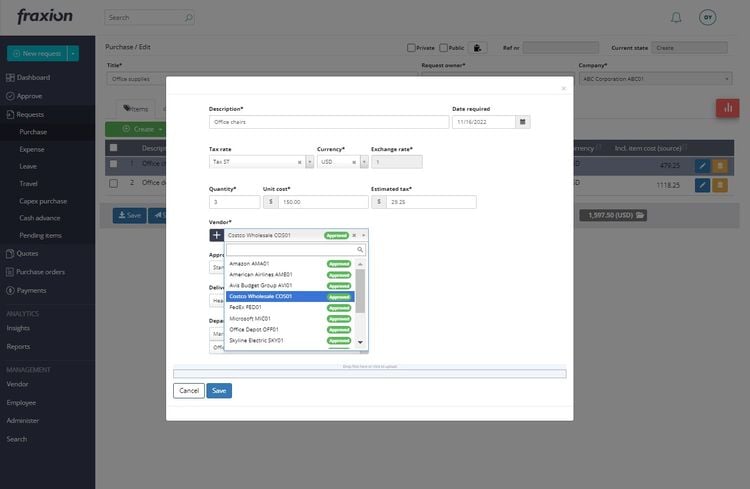
The strong requisition module, combined with its full procure-to-pay suite, makes Fraxion a strong option for small mid-market companies. Pricing starts at $399/month for 10-25 employees, and jumps to $749/month (starting) for midsize companies with 25-100 employees. It also integrates with several leading ERP and accounting systems for a unified tech stack.
ProcureDesk - Best for Retail
ProcureDesk is particularly effective for companies managing high volumes of vendor interactions and invoices. It includes advanced purchase order tracking and a three-way matching system, making it well-suited to handling complex supplier networks.
After approval, the system auto-generates a purchase order and provides tracking details that indicate whether the vendor has opened the email, acknowledged the purchase, or provided shipping updates. The system also integrates directly with vendor tracking numbers, so you can receive real-time delivery updates. This gives you accurate timelines for replenishment and helps you avoid delays due to overlooked purchase orders.
On the back end, ProcureDesk’s three-way matching process ensures accuracy across purchase orders, supplier invoices, and goods received. The optical character recognition (OCR) tool extracts data from vendor invoices, matching them to the relevant purchase order and receipt. The system flags any pricing mismatches or missing receipts and escalates them to your team. This helps you address discrepancies and verify that all payments comply with pre-negotiated terms.
Coupa - Best for Professional Services
Coupa Procurement supports firms with department-led purchasing across locations and client projects. When consultants or project managers need to request software licenses, services, or travel, Coupa’s guided request tool walks them through the process—no procurement background needed. When a team member logs in, they can choose the “Not Sure? Let us guide you” option from the homepage.
The system displays items from a pre-approved catalog or directs users to shop through integrated supplier storefronts. Items added to the cart are pulled into the requisition interface, where your team can review and edit them before submission. Coupa even pre-populates shipping addresses, cost centers, and funds based on the requester’s profile.
From there, users can view exactly what approval steps are needed. This can help them anticipate delays and adjust if needed, like tweaking delivery timelines or choosing a lower-cost vendor. The submitted request then routes through the approval chain automatically and triggers a purchase order once approved. That PO is then sent to the supplier, with Coupa maintaining a full audit trail of each request.
While Coupa doesn’t list pricing publicly, it falls in our high-tier range for procurement software. This ranges from $45,000 to $150,000/year for companies with 150 to 500 employees.
What is Purchase Requisition Software?
Purchase requisition software is a centralized platform that automates the creation and approval of purchase requests and purchase orders. It allows users to submit purchase requests electronically, which the software then routes to the appropriate user for review and approval.
Purchase requisition software can help organizations streamline their purchasing process, reduce errors, and eliminate paperwork. It also provides visibility into spending patterns and helps organizations control costs by enforcing spending limits and identifying areas where cost savings can be achieved.
Purchase requisition capabilities are typically sold as part of a complete procurement software, which includes common features such as:
- Requisition management
- Purchase order management
- Contract management
- Supplier management
- Strategic sourcing
- Spend analysis
Features of Purchase Requisition Software
| Feature | Functionality |
| Creating and tracking purchase orders | Standardizes purchasing documentation with templates; Compares purchases against budgets; tracks purchase orders throughout their lifecycle from creation to delivery with order and payment status updates. |
| Managing requisitions and approvals | Formalizes the review and approval process with automated approval routing to improve cost control and gain visibility into purchasing habits; Ensures procurement policy compliance. |
| Supplier management | Track vendor order history, payment history, contracts, and communications. |
| Product and service catalog | Compiles a catalog of products with pricing and item details, often through a retailer's PunchOut catalog system; classifies items and services and helps define purchasing guidelines. |
| Recurring purchase orders | Recurring purchase orders based on time or inventory levels; ensure consistent supply levels and reduce the need for manual purchase order input. |
| Processing invoices and purchase orders | Automates matching vendor invoices to internal purchase orders to ensure cost control and timely payment. |
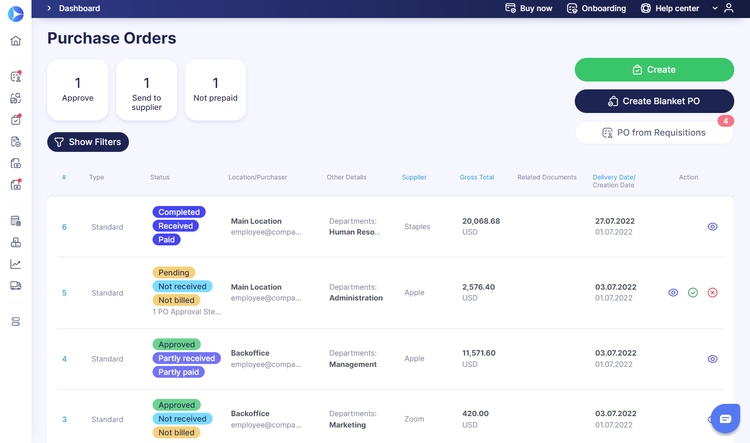
Benefits
Purchase requisition software’s centralized purchasing system helps organizations optimize their purchasing and procurement process, increase efficiency, reduce costs, and gain accountability and transparency in purchasing. Additionally, purchase requisition software enables organizations to make data-driven decisions and negotiate better contracts with suppliers.
Increased Efficiency
Purchase requisition software automates manual tasks such as purchase order creation and approval workflows, reducing the time and effort needed to complete these tasks. Automation increases efficiency and productivity, allowing procurement teams to focus on more strategic activities.
Improved Spend Management
Purchase requisition software provides real-time spend visibility, allowing businesses to track spending and manage budgets more effectively. This tracking helps identify areas where companies can save costs and reduce the risk of overspending.
Enhanced Supplier Management
Purchase requisition software provides a centralized platform for managing supplier relationships. It allows businesses to evaluate supplier performance, negotiate better contracts, and streamline the procurement process, leading to better supplier management and improved collaboration.
Better Data Insights
Purchase requisition software provides detailed analytics and reporting capabilities, allowing businesses to gain insights into procurement performance. These insights help identify areas for improvement and drive data-informed decision-making.
Pricing Guide
Cloud-based purchase requisition software costs vary, starting as low as $99/month for solutions like Tipalti. Procurify, on the other hand, starts at around $1,000/month for small businesses. However, enterprise-level products typically cost more and include advanced features like third-party integrations.
On-premise options offer perpetual licensing with a typical one-time cost between $3,000 and $500,000. Potential ongoing costs include technical support and software updates.
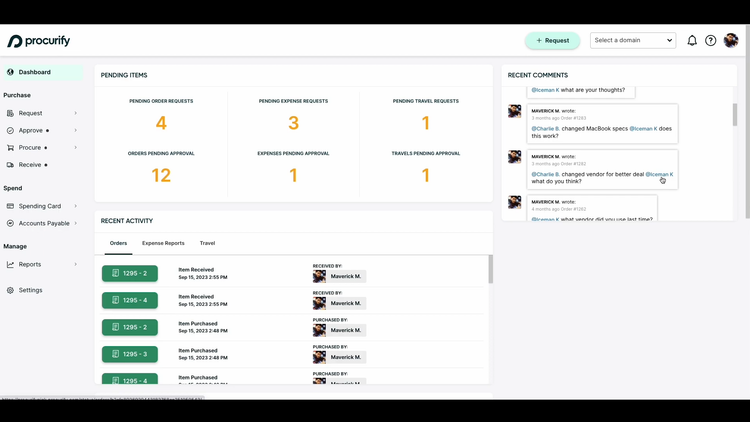
Other Types of Procurement Software
Various types of purchase requisition software are designed to meet businesses’ individual needs. These software programs provide organizations with the tools needed to streamline their purchasing processes, manage spending, and improve supplier relationships. These include purchase order software, spend management software, eProcurement software, supplier management software, and contract management software, among others.
Purchase requisition software sometimes includes features such as contract management and supplier management. Still, sometimes organizations need dedicated solutions to manage these tasks.
Procurement Software
Purchase requisition software and procurement software are used interchangeably. Like purchase requisition software, procurement software automates the purchasing process from requisition to payment and helps organizations save time and money while reducing errors.
Purchase Order Software
Purchase order software is designed to automate the generation of purchase orders, making it easier to manage the approval workflow, spending, supply chain logistics, supplier management, and budgeting. While purchase order software is sometimes used interchangeably with procurement software, not all purchase order software handles procurement.
Procure to Pay Software
Also often used interchangeably with procurement software, procure-to-pay software is more of an end-to-end solution than procurement software. This software is considered a link between accounts payable and purchasing departments, so it also caters to supply chain management practices.
Spend Management Software
Spend management software assists organizations in managing their overall spending, including budgeting, expense tracking, invoice processing, and reporting. Benefits include real-time visibility into financial data, data recording process automation, and spending categorization.
Supplier Relationship Management (SRM) Software
Sometimes called vendor management software, supplier relationship management software helps organizations manage supplier relationships, track supplier performance, and reduce risk. This software also gives users automated follow-up reminders to ensure timely communication with supplier partners.
Contract Management Software
Contract management software enables organizations to create, store, and manage contracts throughout their lifecycle, including negotiating and renewing contracts. In addition, contract management software reduces risk and ensures contract terms and conditions compliance. Procurement teams often use contract management software as a central repository for document management and storing contact information for suppliers. Features include contract creation, contract repository, OCR and advanced search, alerts, reporting, approval management, and workflow management.
Strategic Sourcing Software
Strategic sourcing software enables organizations to solicit quotes and proposals electronically in real-time, allowing suppliers to see their rank among bidders and leverage competitive pressure. Features of strategic sourcing software typically include spend analysis, bid/quote creation, request for proposal (RFP), contract management, and supplier management.




















































